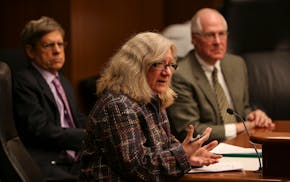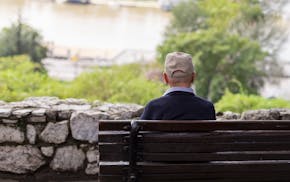Opinion editor's note: Strib Voices publishes letters from readers online and in print each day. To contribute, click here.
•••
I am visiting Paris and I have been reading the thoughts and reflections about George Floyd in the Minnesota Star Tribune ("The legacy of George Floyd," front page, May 25). My initial takeaway is, when (presumably) white writers comment on some version of "Time to move on," I think of my Black friends on the North Side. I am currently involved in some volunteer activities with social workers dealing directly with issues around poverty and domestic violence. Inevitably, when funding gets cut for programs on the Northside, or the heat is on regarding DEI, their typical response is "Been here before, not surprising."
As white people, we can "move on" and go to sleep on the issue like we have done for centuries. Black people do not have that luxury. I have also been surprised, when asked where I'm from, how many Europeans immediately ask about Floyd. The two questions are "Why?" and "What now?" It is in direct contrast to when I took two road trips in the last few years to the South, Southwest and West Coast of the U.S. and, when asked where I am from, not one person commented on Floyd, ever.
We Americans have a history of turning away around race issues. We might see and observe diversity, but psychologically many of us are so separate and disconnected from our Black neighbors that we do not and cannot let in the ongoing nature of their struggle. It is our humane obligation to not turn away but to keep asking ourselves, "What part can I play in ending racism?" The answer is to not move on but to acknowledge the real issues still facing the community. There is great need, and the resources limited within a community still struggling with generational trauma and the resulting poverty and violence. I ask you to think about how you can move toward the community — not move away.
Carol Wichers, Minneapolis
•••
It is deeply disappointing that a federal court has allowed the Department of Justice to abandon its commitment to help bring racial justice to public safety in our city, but the fact is that we don't need the DOJ for this work ("MPD consent decree has been officially dissolved," May 28). Since the murder of Floyd, our city and state governments have been hard at work on transformative legislation, including implementation of many of the 2022 recommendations issued by the Community Safety Work Group. The Minnesota Department of Human Rights negotiated a settlement agreement packed with over 100 pages of specific remedial requirements that are now being implemented under the watchful eye of Effective Law Enforcement for All. Many substantive reforms have already been adopted by the Police Community Relations Council (PCRC), a collaborative group made up of Minneapolis Police Department leadership and members of the Unity Community Mediation Team (UCMT) who hail from all of our most justice-impacted communities. The PCRC's work syncs well with MDHR's mandates because, as detailed in UCMT's recent news release, the 2022 and 2023 agreements signed by MPD to create PCRC provided "the roadmap for transformation of public safety in Minneapolis."
UCMT's news release also reports that the community sites it has opened "in the African American, Native American, Latino, Somali and LGBTQ communities are providing a way for all community members to come to the table and join in this transformational process, including filing complaints of police misconduct, mentoring new officers, mediating community disputes to prevent their escalation to criminal matters."
Our community can and must continue to redouble these efforts without the DOJ, in order to, in the words of UCMT's news release, provide "a living memorial to George Floyd and all the others who have died in senseless violence in our City."
Nancy Albrecht, John Cairns, John Davenport, John Humphrey, Catherine Shreves and John Satorius
The writers are members of the Re-imagining Community Safety Group of Plymouth Congregational Church in Minneapolis.
•••
I went to hear the music of Brass Solidarity on May 26 at George Floyd Square. Their passion, energy and joy for the communal music experience was contagious and a respite at this five-year anniversary of the murder of Floyd. That being said, part of the sadness that I felt being at George Floyd Square was the lack of any seeming progress by the city of Minneapolis to bring the same passion and communal effort to memorialize that corner. I know there have been numerous studies and meetings and proposals but, bottom line, there is such a feeling of neglect and disrespect for the community through inaction. It is not just on Minneapolis, it is on all of us in Minnesota to want something at that intersection that captures the event of Floyd's murder, the emergence of a global movement that acknowledged systemic racism and appreciation for the organic community effort that tries to keep the memorial alive. I am urging the decisionmakers to please keep working on this and let the community know what you need to make that happen.
Diane Johnson, St. Paul
IMMIGRATION
This is a new low
The recent Minnesota Star Tribune article "Courthouse arrests signal new tactic in deportation push" (front page, May 25) lays bare the misinformation campaign by mass deportation strategists. If the immigrants were "rapists and murderers," would they be showing up for court appointments? Many immigrants came legally to the U.S. under Temporary Protected Status (TPS) due to extreme conditions in their homelands and are legally seeking asylum with the hopes of eventually becoming U.S. citizens. However, since TPS protections have been jeopardized, a court appearance could now be a virtual death sentence, like the example of the Venezuelan man highlighted in the article. It should be no surprise that someone would risk undocumented status rather than deportation and resultant impoverishment, and in some cases imprisonment or even death, and become the "illegals" we have been taught to fear.
The Republicans are using one of the oldest political playbooks: Find a scapegoat to focus the blame on to avoid responsibility for your own actions. In their attempts to bolster a president with historically low approval ratings and consumer confidence in rapid decline, reaching out for a scapegoat is understandable. Our state's congressional Reps. Tom Emmer, Brad Finstad, Michelle Fischbach and Pete Stauber have chosen to turn a blind eye to, and even facilitate, the human suffering under recent U.S. deportation practices. What is not understandable is how they can justify the deception to themselves, their families and their supporters.
Craig Larson, Minneapolis
•••
I read with alarm about the new expedited removals of immigrants from U.S. courtrooms, using masked agents from Immigration and Customs Enforcement. Wearing a mask means the wearer of it is ashamed of their actions or fearful or a criminal (or going to a costume party). A federal worker always should be transparent about their actions, or not take that action. That's part of democracy. The U.S. still is a democracy! I urge my congressional representatives to quickly introduce a bill prohibiting all federal workers from wearing masks as they do their jobs.
Anne Ritterspach, Bloomington
WEST POINT SPEECH
See me after class
After reviewing President Donald Trump's commencement address at West Point Academy, I wondered what grade his speech would receive from a speech class at West Point ("West Point graduates get speech from Trump," May 25). With his organization of thoughts, his review of William Levitt's later life, his discussion of trophy wives, would he receive an A or an F? Could he have completed the rigorous West Point curriculum and have been a member of the graduating class of cadets?
John Dyer, Minneapolis

Fierce but compassionate mental health advocate will be missed
Dabney: The plan to raise Minnesota's cannabis tax to 15% will fuel the black market
Opinion: The ever-expanding definition of 'fake news'

